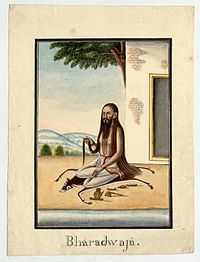Bharadwaja

Bharadwaja also spelled Bhardwaj (Sanskrit: भरद्वाज, IAST: Bharadvāja), was one of the greatest Hindu sages (Maharṣis) descendant of Sage (Ṛṣi) Aṅgirasā, whose accomplishments are detailed in the Purāṇas. He is one of the Saptaṛṣis (Seven Great Sages or Rishis) in the present Manvantara; with others being Atri, Vasiṣṭha, Agastya, Gautama, Jamādgni, Kaśyapa.[1]
Bharadvāja Bārhaspatya is the progenitor of the Bhāradvāja family and the family is attributed as the composers of Sixth Maṇḍala of the Ṛgveda. Maṇḍala 6 is known as the Bhāradvāja Family Book as all its 75 hymns are composed by a member of this family over several centuries.[2] He is believed to be a contemporary of King Bhārata. Maharṣi Bharadvāja and his descendants were respected and powerful priests-like ṛṣi of several clans/dynasties of the Puru tribe, such as the Bhāratas and the Pañcālas.
Sage Bharadvāja was a sage of the Vedic times. He attained extraordinary scholarship. He had the great power of meditation.[3] He is also the author of Āyurveda. His Āśrama still exists at the holy Prayag (Allahabad).
Bharadwaja was also the father of Guru Droṇācārya and grandfather of Aśvatthāma from the epic Mahābhārata.
History
Maharṣi Bharadvāja was the son of Devarṣi Bṛhaspati. Devarṣi Bṛhaspati was the son of Maharṣi Aṅgirasa. These 3 Ṛṣi are called the Traya Ṛṣi, meaning The Three Ṛṣis of the Bharadvāja Gotra. Guru Droṇācārya, the royal guru to Kauravas and Pāṇḍavas in the epic Mahābhārata was the son of sage Bharadvāja. He was a master of advanced military arts, including the Devāstras. Among all the seven gotras Bharadvāja is the largest chain. Bharadvāja gotra has more than 1400 branches.
Bharadvāja in Rāmāyaṇa
In Rāmāyaṇa, Śrī Rāma along with Sita and Lakṣmaṇa went on exile for the words of his father. Rama along with them went through many forest regions starting from crossing Saryu river with help of Guhan, head clanman and a friend of Rama's father Daśaratha. As he traveled he visited many Rishi's Ashrams and met many rishis and sages including Agastya, Gautama and Bharadvāja. Śrī Rāma and others rested in Bharadvāja's āśrama when they were crossing Prayag and accepted his offerings as great sages knew that Śrī Rāma is incarnation of Mahā Viṣṇu, Sitā Devī is goddess Lakṣmī and Lakṣmaṇa is none other than Śeṣa Nāga.
Bharadvāja in Buddhism
In the Buddhist Vinaya Pitaka of the Mahavagga (I.245)[4] section the Buddha pays respect to Bharadwaja by declaring that the Veda in its true form was declared to the Vedic rishis "Atthako, Vâmako, Vâmadevo, Vessâmitto, Yamataggi, Angiras, Bhâradvâjo, Vâsettho, Kassapo, and Bhagu"[5] and because that true Veda was altered by some priests he refused to pay homage to the altered version.[6]
References
- ↑ Inhabitants of the Worlds Mahānirvāṇ Tantra, translated by Arthur Avalon, (Sir John Woodroffe), 1913, Introduction and Preface
- ↑ http://rigvedaanalysis.wordpress.com/2012/01/24/bharadvajas/
- ↑ http://ancientindians.net/rshis-rishis-rushis/bharadwaja/
- ↑ P. 494 The Pali-English dictionary By Thomas William Rhys Davids, William Stede
- ↑ P. 245 The Vinaya piṭakaṃ: one of the principle Buddhist holy scriptures ..., Volume 1 edited by Hermann Oldenberg
- ↑ The Vinaya Pitaka's section Anguttara Nikaya: Panchaka Nipata, P. 44 The legends and theories of the Buddhists, compared with history and science By Robert Spence Hardy
| |||||||||||||||||
| ||||||||||||||
%2C_ca._1780.jpg)
